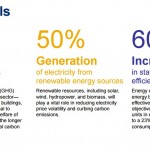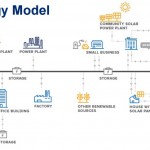Recently, The New York Public Service Commission (PSC) announced a plan called Reforming the Energy Vision (REV) to help consumers make better and more informed energy choices, enable the development of new energy products and services, protect the environment and create new jobs and economic opportunity throughout New York State. REV will also overhaul the regulations that govern utility companies,and create and promote new energy markets. According to the PSC, the initiative seeks to give customers more choice and control over their energy usage for every dollar spent on utility bills, and to promote a private-sector-driven clean energy market. REV is also designed to significantly reduce the amount of money spent on crumbling energy infrastructure.
Increasingly extreme weather events, coupled with excessive environmental issues and rising costs of fossil fuel dependence compelled regulators to adopt this policy. The policy favors small scale energy sources like rooftop solar, residential wind, battery storage, combined heat and power, energy efficiency, demand response, and other decentralized energy resources. A decentralized system based on these resources is generally more efficient and resilient (meaning it can better withstand or recover from extreme weather events and outages).
“To spur the creation of the electric grid of the 21st century, the commission’s initiative will lead to a top-to-bottom restructuring of the state’s energy-efficiency programs to ensure that New Yorkers have access to reliable, clean and competitively priced electric power,” said New York commissioner Audrey Zibelman, a strong proponent of the initiative.
“The end goal of the process will be to give consumers greater freedom to manage their total energy bill,” she said.
YSG Solar’s community solar development aligns with the goals of REV and New York State’s energy plan.
Goals of the REV initiative include reforming New York State’s energy industry and regulatory practices, promoting energy-efficient programs and increasing renewable energy resources such as wind and solar. It also aims to promote the use of more distributed energy resources such as microgrids or on-site power supplies and energy storage, encourage customer use of advanced energy management products such as demand response and empower customers by allowing them more choice in how they manage and consume electric energy.
The initiative also ties in with the draft State Energy Plan released the beginning of the year, which calls for more customer choice and private-sector-driven clean energy markets.


